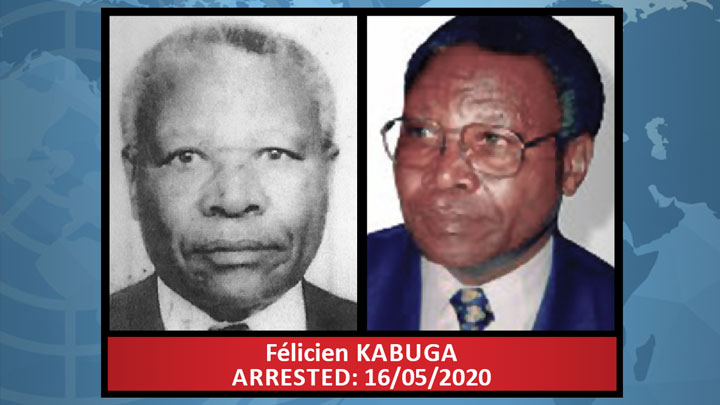Who Should Try Rwandan Genocide Suspect Felicien Kabuga?
AFRICA, 8 Jun 2020
Nicola Palmer | Al Jazeera - TRANSCEND Media Service
Many Rwandans would like to see the man accused of funding the 1994 genocide against the Tutsi put on trial in Rwanda.
2 Jun 2020 – The legal battles over where Felicien Kabuga should be tried have begun.
The former businessman accused of being a major financial backer of Hutu extremism in the build-up to, and during, the 1994 genocide against the Tutsi in Rwanda was arrested in a flat on the outskirts of Paris on May 16.
As an international fugitive, Kabuga is thought to have lived in at least six countries in his 26 years on the run. He could now be tried in locations as diverse as Tanzania, France, the Netherlands or Rwanda. Where this trial is held matters. A trial in Rwanda will be more meaningful to the people who experienced the genocidal violence Kabuga is indicted for.
When French police entered Kabuga’s flat, they were acting on an indictment and arrest warrant issued by the International Residual Mechanism for Criminal Tribunals (IRMCT), charging Kabuga with genocide and six other related offences. The IRMCT was set up to conclude the work of the United Nations International Criminal Tribunal for Rwanda (ICTR) established by a Security Council resolution in 1994.
In Kabuga’s first two court appearances in France, his lawyers indicated that they would oppose their client’s transfer to the IRMCT on the basis of fair trial concerns before this international court and would argue for a domestic trial in France. At the same time, the IRMCT has initially rejected, although not entirely ruled out, Prosecutor Serge Brammertz’s request to transfer Kabuga to The Hague in the Netherlands rather than Arusha, Tanzania, the former seat of the ICTR.
A trial in Rwanda is also possible, either in situ under the auspices of the IRMCT if deemed “in the interests of justice” or through the referral of the case by this international court to Rwanda. To date, the IRMCT has referred three suspects along with five fugitive dossiers to Rwanda. However, it retains exclusive jurisdiction over “the most senior leaders suspected of being most responsible”, a category into which Kabuga is currently assumed to fall.
Why does it matter where Kabuga is tried?
Kabuga’s case fits into a wide and deeply contested picture of post-genocide justice. The Security Council, the IRMCT, the Rwandan and French states and Rwandan citizens are all embroiled in these processes and have a stake in the outcome.
Inside Rwanda, among everyday citizens there are strong views on where genocide trials should be heard. A consortium of genocide survivor groups has issued a statement arguing for Kabuga’s trial to be held in Rwanda.
In the 26 years since the genocide, in which an estimated 800,000 people lost their lives, most Rwandan citizens have directly experienced post-genocide justice primarily through their mandatory participation in the “gacaca” courts. Gacaca was a state-implemented but locally administered process based on a traditional Rwandan dispute resolution mechanism. With 12,000 courts in operation across the country from 2005 until 2012, most Rwandans participated in gacaca as witnesses, victims, perpetrators or lay community judges known as inyangamugayo.
My earlier research found that citizens’ personal experience of gacaca profoundly shaped their views on the full range of judicial proceedings undertaken at the national, international and indeed, transnational level. Many Rwandan citizens strongly believe that the senior suspects should have to account directly to their community. In my interviews, international proceedings were criticised on the terms set by Rwandan citizens’ own experience of post-genocide justice. As one gacaca participant told me:
“In Arusha, the big fish are there. The victims travel there, but in gacaca, everyone is already here; survivors, perpetrators, judges, they are all here in the community. That is the difference … Those in Arusha haven’t asked for forgiveness yet they have committed many crimes here. They should face us, the Rwandan family, but they avoid us by being there.”
For this Rwandan, and many others, there is a sense that they have had to grapple with domestic accountability for the crimes committed in 1994, and those who are alleged to have led and financed these crimes should do the same. However, gacaca is not the only litigation relevant to how Kabuga’s case is being interpreted.
For the Rwandan government, his arrest fits into a wider project of tracking down genocide suspects around the world. It signals to the wider Rwandan diaspora that their government’s penal powers can reach beyond its borders. According to their most recent report, the Rwandan Genocide Fugitives Tracking Unit (GFTU), a specialist unit of the National Public Prosecution Authority (NPPA), has issued 911 indictments for genocide suspects still at large. With legal proceedings currently under way in 20 countries, I have been mapping this final phase of genocide-related litigation. This mapping project shows that 19 individuals have been deported or extradited to Rwanda while 31 have had their extradition denied based on concerns about fair trial rights and the legislative framework in Rwanda. Most of these refusals to extradite have occurred before French courts.
For France, Kabuga’s arrest is part of a recent increase in litigation relating to the genocide which overlaps with its complex historical relationship with the Rwandan state and reinforces its domestic immigration controls. To date, there have been five domestic criminal trials of Rwandan genocide suspects in France, including two cases transferred from the ICTR. Also, there have been 20 cases in France denying the extradition of genocide suspects to Rwanda based initially on fair trial and then on legislative concerns. If Kabuga is not transferred to the IRMCT, Rwanda would face a very hard task trying to extradite him and a French criminal trial would likely follow.
While not wanting to extradite individuals to Rwanda, immigration proceedings have gone forward in France. Six individuals, including former Rwandan first lady Agathe Kanziga Habyarimana, have had their refugee protection or residency permits revoked based on “serious reasons for considering” that these individuals “have committed a crime against the peace, a war crime or a crime against humanity”, leaving them in legal limbo. The immigration proceedings offer a far more positive reading of fair trial in Rwanda than found in the initial extradition decisions.
These different judicial proceedings serve different French interests. Denying extradition expresses a view on Rwanda’s criminal laws and processes. Removing citizenship or refugee protection is internally oriented. It communicates a view on the types of people that are deemed not to belong in France.
For the IRMCT, the arrest of Kabuga helps to justify its continued financing by the Security Council which has been pushing for the conclusion of these international proceedings relating to Rwanda since 2003. In addition, a trial in The Hague, which may still transpire, aligns with Prosecutor Serge Brammertz’s own ambitions, as he is currently one of the candidates who could be appointed as the next prosecutor for the permanent International Criminal Court (ICC). All of these interests are at play in how Kaguba’s case goes forward.
The Rwandan genocide is one of the most extensively litigated episodes of mass violence in recent history. In addition to this most recent wave of cases, at the international level, 61 people have been convicted and 14 acquitted by the ICTR, there have been extensive domestic criminal trials inside Rwanda and more than 600,000 people have been tried by gacaca for direct participation in the genocide and many more for property-related offences.
All of Rwanda’s post-genocide justice processes have been praised for establishing crucial information about how the genocidal violence occurred, naming the specific individuals who were killed and holding particular people responsible for the violence. The arrest of Kaguba must be understood in the context of this much wider picture of post-genocide justice because that it is how it will be understood by Rwandans inside and outside of the country.
_____________________________________________
Tags: Africa, Genocide, Genocide Convention, Justice, Rwanda
DISCLAIMER: The statements, views and opinions expressed in pieces republished here are solely those of the authors and do not necessarily represent those of TMS. In accordance with title 17 U.S.C. section 107, this material is distributed without profit to those who have expressed a prior interest in receiving the included information for research and educational purposes. TMS has no affiliation whatsoever with the originator of this article nor is TMS endorsed or sponsored by the originator. “GO TO ORIGINAL” links are provided as a convenience to our readers and allow for verification of authenticity. However, as originating pages are often updated by their originating host sites, the versions posted may not match the versions our readers view when clicking the “GO TO ORIGINAL” links. This site contains copyrighted material the use of which has not always been specifically authorized by the copyright owner. We are making such material available in our efforts to advance understanding of environmental, political, human rights, economic, democracy, scientific, and social justice issues, etc. We believe this constitutes a ‘fair use’ of any such copyrighted material as provided for in section 107 of the US Copyright Law. In accordance with Title 17 U.S.C. Section 107, the material on this site is distributed without profit to those who have expressed a prior interest in receiving the included information for research and educational purposes. For more information go to: http://www.law.cornell.edu/uscode/17/107.shtml. If you wish to use copyrighted material from this site for purposes of your own that go beyond ‘fair use’, you must obtain permission from the copyright owner.

